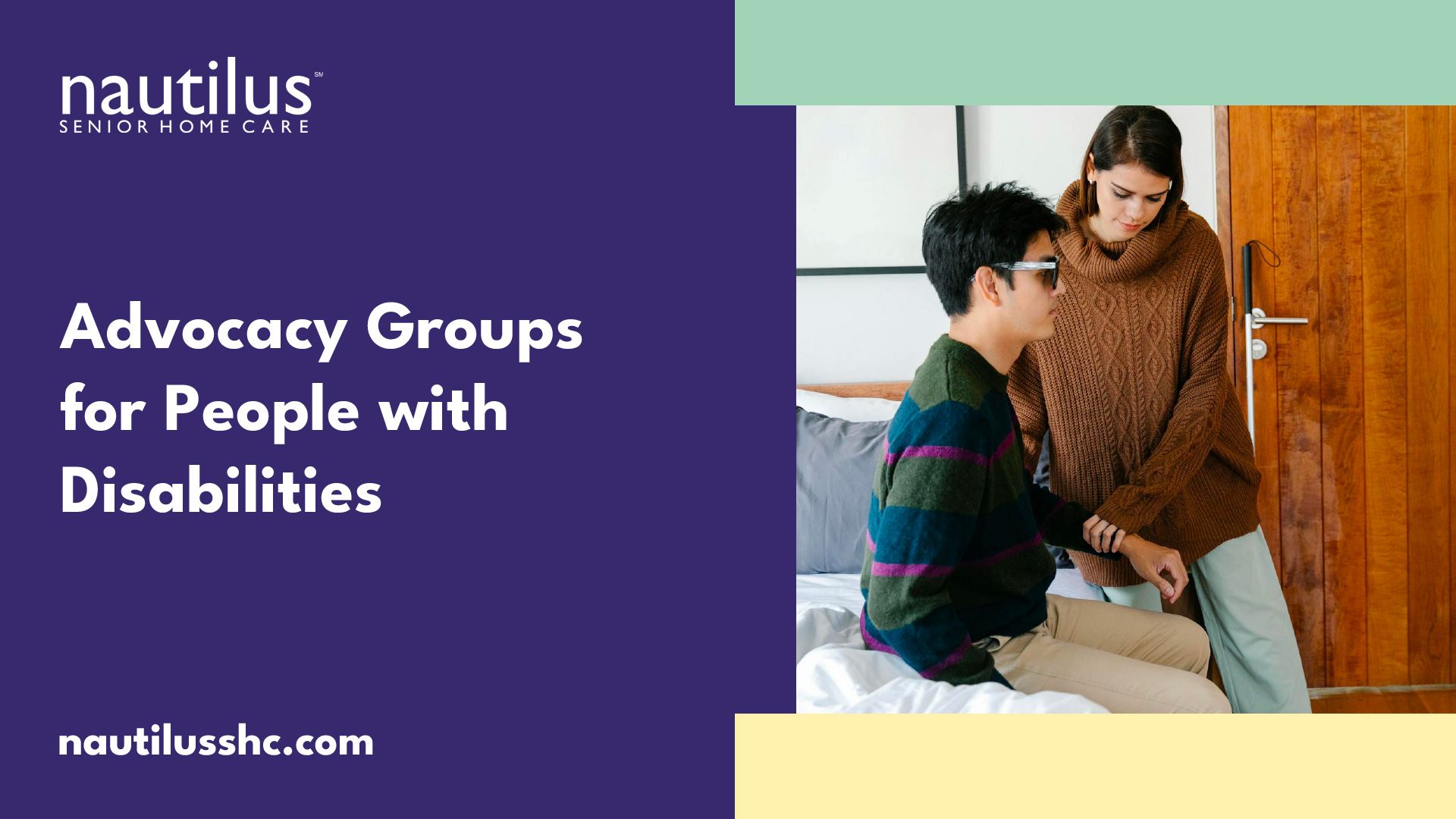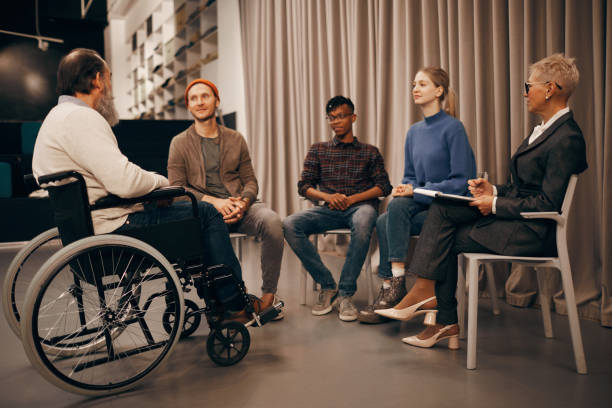The Power of Disability Advocacy Groups
Disability advocacy groups play a crucial role in providing support, empowerment, and representation for individuals with disabilities. These groups understand the unique challenges faced by the disabled community and work tirelessly to promote inclusivity and equality. Let’s explore the importance of support and the role that disability advocacy groups play in creating a more inclusive society.

Understanding the Importance of Support
Support is a fundamental aspect of any individual’s well-being, and for people with disabilities, it is even more crucial. Disability advocacy groups provide a safe and understanding environment where individuals can connect with others who have similar experiences. This sense of community and shared understanding offers emotional support, reduces feelings of isolation, and fosters a sense of belonging.
Moreover, disability advocacy groups are a valuable source of information and resources. They offer guidance on navigating various aspects of life, including healthcare, education, employment, and accessibility. Through their collective knowledge and expertise, these groups empower individuals to make informed decisions and advocate for their rights.
The Role of Disability Advocacy Groups
Disability advocacy groups play a multifaceted role in society. They serve as a powerful voice for the disabled community, advocating for fair and equal treatment. These groups work tirelessly to raise awareness about the challenges faced by individuals with disabilities and strive to eliminate stigmas and misconceptions.
In addition to advocating for change on a broader scale, disability advocacy groups also provide direct support and assistance to individuals. They offer guidance on navigating legal and bureaucratic systems, ensuring that individuals can access the rights and benefits they are entitled to. These groups also engage in community outreach, organizing events, workshops, and educational programs to promote inclusion and understanding.
By amplifying the voices of individuals with disabilities, disability advocacy groups help to shape policies and legislation that promote inclusivity and accessibility. They collaborate with government agencies, businesses, and other organizations to ensure that the needs and rights of the disabled community are recognized and respected.
The power of disability advocacy groups lies in their ability to bring people together, foster support and understanding, and drive positive change. Through their tireless efforts, these groups empower individuals with disabilities, promote inclusivity, and work towards a more equitable society for all.
Types of Disability Advocacy Groups
Disability advocacy groups play a vital role in providing support, resources, and representation for individuals with disabilities. These groups can be categorized into different types based on their scope and reach. Let’s explore three common types of disability advocacy groups: local support groups, national and international organizations, and online communities and forums.
Local Support Groups
Local support groups are grassroots organizations that operate within a specific geographic area, such as a city or town. These groups focus on providing a sense of community and support for individuals with disabilities and their families in a local setting. They often organize regular meetings, workshops, and social events to foster connections and share experiences.
Local support groups are valuable for individuals seeking direct, face-to-face interaction with others who understand the challenges and triumphs of living with a disability. These groups provide a safe space for individuals to express themselves, seek advice, and receive emotional support from peers who share similar experiences.
National and International Organizations
National and international disability advocacy organizations operate on a larger scale, working to address the needs and rights of individuals with disabilities at a broader level. These organizations often have regional or national chapters and focus on influencing policies, advocating for legislative changes, and promoting inclusivity and accessibility on a wider scale.
These organizations offer resources, information, and guidance to individuals with disabilities, their families, and professionals working in the field. They may provide support through helplines, websites, publications, and educational programs. National and international organizations also engage in public awareness campaigns to promote understanding and acceptance of disabilities.
Online Communities and Forums
In the digital era, online communities and forums have become an essential part of disability advocacy. These platforms offer individuals with disabilities an opportunity to connect and engage with others worldwide, regardless of geographical boundaries. Online communities provide a space for sharing stories, exchanging advice, and finding support from individuals who may face similar challenges.
These virtual communities and forums can be found on social media platforms, dedicated websites, or through specialized apps. They offer a convenient way for individuals to participate in discussions, access resources, and seek guidance from a diverse range of people with disabilities, caregivers, and advocates. Online communities also provide a platform for raising awareness and advocating for change on a global scale.
By understanding the different types of disability advocacy groups available, individuals can choose the level of support and engagement that best meets their needs. Whether it’s seeking local connections, accessing national resources, or engaging in online discussions, these groups play a crucial role in fostering empowerment, providing information, and advocating for the rights and well-being of individuals with disabilities.
Benefits of Joining a Disability Advocacy Group
Joining a disability advocacy group can bring about numerous benefits for individuals with disabilities. These groups provide a supportive and empowering environment, along with access to essential resources, information, and opportunities for advocacy and representation.
Peer Support and Empowerment
One of the significant benefits of joining a disability advocacy group is the opportunity for peer support and empowerment. Being part of a community of individuals who have faced similar challenges can be incredibly reassuring and uplifting. Members can share their experiences, provide emotional support, and offer guidance on navigating various aspects of life with a disability. This sense of belonging and solidarity can boost confidence and overall well-being.
Access to Resources and Information
Disability advocacy groups serve as valuable sources of information and resources. These groups often have access to a wealth of knowledge and expertise on disability-related topics, ranging from healthcare and accessibility to education and employment. Through workshops, seminars, and informational materials, members can gain insights, learn new skills, and stay updated on the latest developments in disability rights and services. This information empowers individuals to make informed decisions, access necessary support, and overcome obstacles.
Resources and Information
- Workshops and seminars
- Informative materials
- Access to experts and professionals
- Updates on disability rights and services
Advocacy and Representation
Advocacy and representation are at the core of disability advocacy groups. These groups actively work towards creating positive change and improving the lives of individuals with disabilities. They advocate for equal rights, inclusivity, and accessibility in various realms, such as education, employment, healthcare, and public spaces. By joining a disability advocacy group, individuals can have their voices heard and contribute to collective efforts aimed at influencing policies, raising awareness, and challenging societal barriers.
Advocacy and Representation
- Influencing policies and legislation
- Raising awareness about disability rights
- Challenging societal barriers
- Promoting inclusivity and accessibility
By becoming a member of a disability advocacy group, individuals with disabilities can experience the power of peer support, gain access to valuable resources and information, and actively participate in advocacy and representation efforts. These benefits contribute to a stronger sense of community, increased self-advocacy skills, and the potential for positive societal change.
Examples of Successful Disability Advocacy Groups
Disability advocacy groups play a vital role in promoting the rights and well-being of individuals with disabilities. These groups work tirelessly to raise awareness, provide support, and advocate for inclusive policies and practices. Here, we highlight some notable organizations that have made a significant impact in the field of disability advocacy.
Highlighting Notable Organizations
Organization and Description
- The National Federation of the Blind (NFB): The NFB is one of the largest and oldest advocacy organizations for the blind and visually impaired community. They strive to improve the lives of blind individuals through various initiatives, including education, employment, and accessibility advocacy.
- Autism Speaks: Autism Speaks is a renowned organization dedicated to promoting solutions, support, and awareness for individuals on the autism spectrum. They work towards enhancing research, advocating for policy changes, and providing resources for individuals and families affected by autism.
- The American Association of People with Disabilities (AAPD): The AAPD is the largest cross-disability organization in the United States, advocating for the rights and inclusion of people with disabilities. They focus on areas such as employment, education, healthcare, and accessible technology, aiming to create a society that values and supports individuals with disabilities.
Impactful Initiatives and Achievements
These organizations have achieved remarkable milestones and launched initiatives that have positively impacted the lives of individuals with disabilities. Here are a few examples:
- The National Federation of the Blind (NFB) successfully campaigned for the passage of the Americans with Disabilities Act (ADA) in 1990. This landmark legislation has been instrumental in protecting the rights of individuals with disabilities and ensuring equal access to employment, public accommodations, and transportation.
- Autism Speaks has made significant contributions to autism research, funding studies that focus on understanding the causes, prevention, and treatment of autism spectrum disorders. Their efforts have led to advancements in early intervention strategies, increased awareness, and improved support for individuals and families affected by autism.
- The American Association of People with Disabilities (AAPD) played a crucial role in advocating for the inclusion of disability-related provisions in the Affordable Care Act (ACA). These provisions aim to ensure that individuals with disabilities have access to affordable and comprehensive healthcare services, eliminating discriminatory practices.
These are just a few examples of the impactful work carried out by disability advocacy groups. Through their dedication and advocacy efforts, these organizations have helped shape policies, raise awareness, and improve the lives of individuals with disabilities across the globe.
By highlighting the achievements and initiatives of these notable organizations, we hope to inspire individuals to get involved in disability advocacy and support the ongoing efforts to create a more inclusive and accessible society for all.
Getting Involved in Disability Advocacy
If you are passionate about making a difference in the lives of individuals with disabilities, getting involved in disability advocacy groups is a wonderful way to contribute and create positive change. Here are two key aspects to consider when getting involved in disability advocacy: finding the right group for you and exploring ways to make a difference.
Finding the Right Group for You
When it comes to disability advocacy, there are a variety of groups to choose from. It’s important to find a group that aligns with your interests, values, and goals. Here are a few steps to help you find the right group:
- Research: Begin by researching different disability advocacy groups in your local community, nationally, and even internationally. Look for groups that focus on the specific disability or cause that resonates with you.
- Attend Meetings: Attend meetings or events hosted by different disability advocacy groups to get a firsthand experience of their activities and to meet the members. This will give you an opportunity to gauge their approach, culture, and level of commitment.
- Connect with Others: Engage with individuals who are already involved in disability advocacy. Seek their advice and ask about their experiences with different groups. They can provide valuable insights and recommendations based on their own involvement.
- Consider Your Skills and Interests: Assess your own skills, interests, and strengths. Determine how you can contribute effectively to a disability advocacy group. For example, if you have strong communication skills, you may be interested in participating in public speaking or awareness campaigns.
Remember, finding the right group may take time and exploration. It’s important to choose a group that aligns with your values and provides a supportive and inclusive environment.
Ways to Contribute and Make a Difference
Once you have found the right disability advocacy group, there are several ways you can contribute and make a difference. Here are a few suggestions:
- Volunteer: Offer your time and skills to support the activities and initiatives of the advocacy group. This could involve assisting with events, fundraising, or providing administrative support.
- Share Your Story: Share your personal experiences and journey with disability to raise awareness and inspire others. Your story can help educate the public and promote understanding and empathy.
- Advocate for Change: Use your voice to advocate for policy changes and improvements in areas such as accessibility, healthcare, employment, and education. Participate in lobbying efforts and engage with policymakers to bring about meaningful change.
- Support Peer Mentoring: Offer support and mentorship to individuals with disabilities who may be facing similar challenges. Sharing your knowledge and experiences can empower and uplift others in the community.
By finding the right disability advocacy group and actively getting involved, you can contribute to creating a more inclusive and supportive society for individuals with disabilities. Every effort, no matter how small, can make a significant impact on the lives of others.



